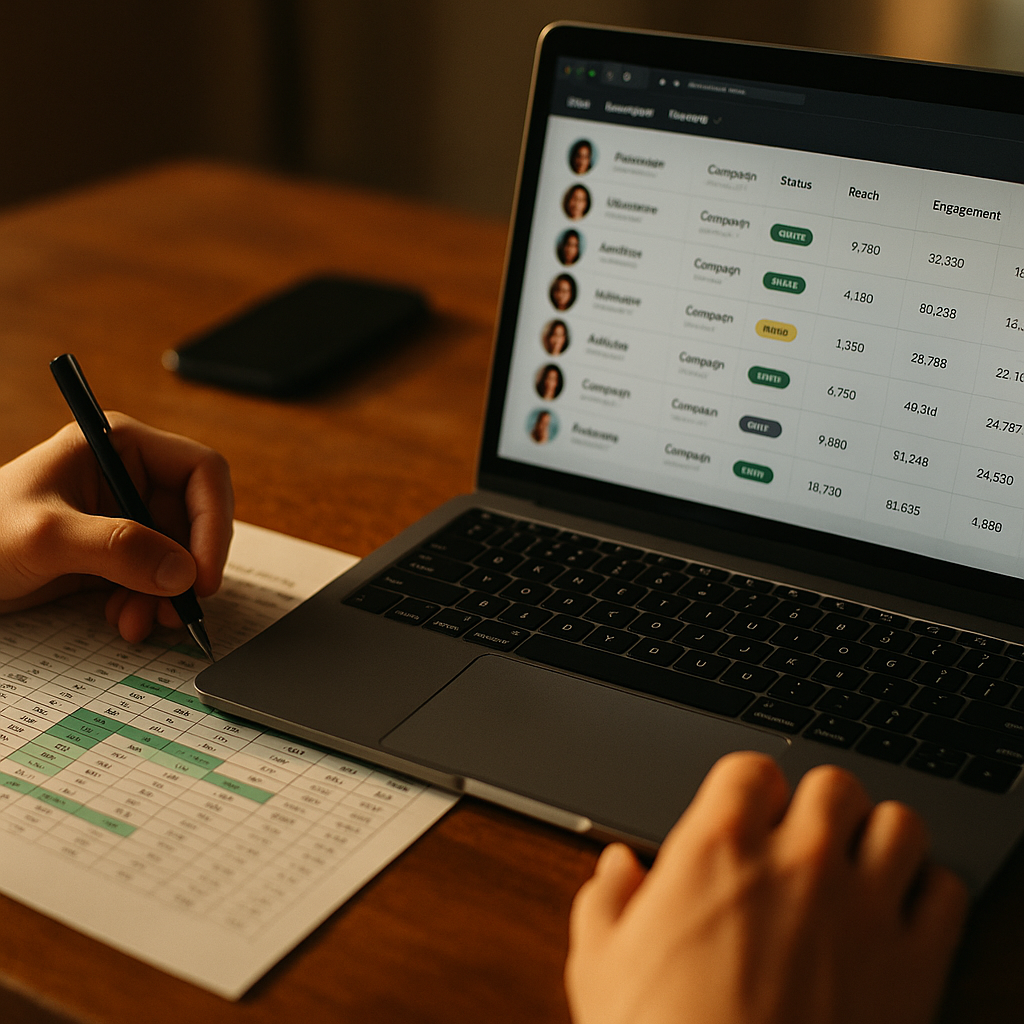When running modern marketing efforts, influencer campaign tracking spreadsheets and specialized software have become essential for brands striving to analyze impact and ROI. Discover which approach can deliver accurate data, save time, and scale with your influencer marketing ambitions. Dive into this comparison to ensure your next campaign is set up for success.
Understanding Influencer Campaign Tracking Spreadsheets
Influencer campaign tracking spreadsheets are widely used tools for small teams or brands just starting influencer outreach. Built on platforms like Excel or Google Sheets, they allow users to manually input metrics—such as costs, reach, impressions, and conversion rates—across various influencer partnerships.
These spreadsheets offer customization and flexibility. You decide what data to track, how to structure the reporting, and who on your team gets access. For straightforward campaigns involving a limited roster of creators, these spreadsheets provide clear records of deliverables and outcomes. They also require little to no investment, making them attractive for startups and businesses closely monitoring marketing budgets.
The Rise of Specialized Influencer Campaign Management Tools
The emergence of specialized influencer campaign management tools has transformed how brands approach digital outreach. These platforms—ranging from Traackr to Upfluence—automate content tracking, monitor real-time metrics, and often provide dashboards that visualize campaign ROI at a glance. By integrating directly with popular social media channels, they minimize errors inherent to manual data entry.
Software solutions unlock advanced features:
- Automated reporting: Real-time analytics, customizable dashboards.
- Content monitoring: Track engagement on specific posts across platforms.
- Campaign collaboration: Enable teams and stakeholders to coordinate in one environment.
- Fraud detection: Spot inauthentic engagement and audience anomalies using AI.
In 2025, as influencer marketing budgets continue to rise, many mid-sized to enterprise brands demand these integrated solutions for efficiency and scale.
Comparing Data Accuracy and Scalability
One significant factor in choosing between tracking spreadsheets and specialized influencer software is data reliability. Spreadsheets rely on manual input and regular updates—an element prone to human error as campaigns become complex. Teams tracking dozens of influencers and hundreds of posts may find it difficult to ensure consistent, error-free reporting.
Specialized influencer campaign management tools, however, automate data collection. They extract engagement stats, audience insights, and even sentiment analysis directly from social feeds or APIs. This automation dramatically reduces human error, supporting both micro and macro-influencer campaigns without the risk of data gaps. For brands planning to scale influencer programs in 2025, automation ensures consistent, real-time measurements that drive smarter business decisions.
Cost and Accessibility: Which Solution Fits Your Budget?
Budget considerations play a pivotal role in the choice between influencer campaign tracking spreadsheets and advanced management software. Spreadsheets are free or low-cost, accessible to anyone with a computer and basic knowledge of Excel or Google Sheets. Their flexibility enables small businesses or agencies to launch influencer projects with minimal upfront expense.
Specialized software, in contrast, often operates on a subscription model. Licenses may range from under $100 per month to several thousand dollars, depending on campaign volume and required features. Is the investment justified? For organizations running multiple campaigns, juggling hundreds of influencers, or requiring ongoing compliance and reporting, the time saved and error reduction often outweigh the cost. For small-scale or infrequent campaigns, spreadsheets still offer the best return on investment in 2025.
Workflow Integration and Team Collaboration
Efficient influencer marketing relies on seamless team collaboration and workflow integration. Tracking spreadsheets can be shared among users via cloud services, but simultaneous edits, tracking version history, or providing real-time updates quickly become challenging in multi-person teams.
Modern influencer campaign management software solves these issues by integrating workflow automation, task assignments, deadline tracking, and even communication tools within one platform. Campaign stakeholders can review updates in real-time, provide approvals, and communicate with influencers without leaving the system. This centralization increases transparency and project velocity—critical factors for agile teams working across multiple product launches or seasonal campaigns.
Making the Right Choice in 2025: Factors to Consider
The optimal influencer campaign tracking solution in 2025 depends on several factors unique to your brand and goals. If you manage limited collaborations and prioritize budget, tracking spreadsheets remain a reliable, customizable tool. For organizations scaling efforts or requiring high-fidelity, real-time analytics, specialized software provides unrivaled value and automation.
- Assess the volume and frequency of your influencer campaigns.
- Consider who needs access and how teams collaborate on reporting.
- Weigh potential errors from manual work against the costs of automation.
- Identify regulatory needs such as data integrity, privacy, and reporting at scale.
In 2025, the influencer marketing landscape is more competitive than ever; selecting the right campaign tracking tool is critical for long-term growth and ROI.
FAQs: Influencer Campaign Tracking Spreadsheets Vs Specialized Software
- Which is better for a small business on a tight budget?
Spreadsheets usually fit tight budgets because they’re free and require basic skills. They’re suitable for limited campaigns but can become unwieldy as data volume grows. - Is influencer campaign management software worth the investment?
For frequent, large-scale, or multi-team campaigns, software saves time, improves accuracy, and enables advanced analytics that manual spreadsheets can’t match. - How does software reduce fraud in influencer marketing?
Most platforms use algorithms to detect fake followers, bots, or suspicious engagement patterns, flagging them before brands commit resources. - Can spreadsheets handle influencer marketing compliance requirements?
Manual tracking can miss important compliance data points, such as specific disclosure language or location data. Automated software makes it easier to track such metrics at scale. - What about privacy and data security?
Leading influencer management tools offer dedicated security features and comply with global privacy regulations, whereas spreadsheets may be at risk if shared without safeguards.
Choosing between influencer campaign tracking spreadsheets and specialized software comes down to your scale, needs, and growth targets. For brief, budget-friendly campaigns, spreadsheets work. But for maximizing accuracy, collaboration, and ROI in 2025’s crowded influencer space, specialized software increasingly leads the way.
